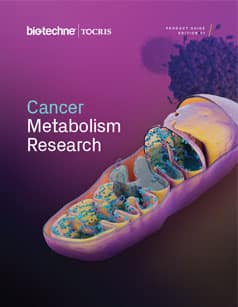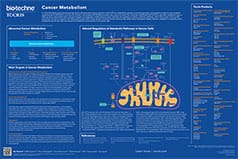Cell Metabolism
Cellular metabolism is the set of chemical reactions that occur in living organisms in order to maintain life. Cellular metabolism involves complex sequences of controlled biochemical reactions, better known as metabolic pathways. These processes allow organisms to grow and reproduce, maintain their structures, and respond to environmental changes.
To view Bio-Techne's complete solutions for lipid metabolism, glucose homeostasis, and energy balance, please visit our metabolism page on bio-techne.com
Cell Metabolism Target Files
Regulation
The chemical reactions of metabolism are organized into metabolic pathways, in which one chemical is transformed into another by a sequence of enzymes. Enzymes are crucial to metabolism and allow the fine regulation of metabolic pathways to maintain a constant set of conditions in response to changes in the cell's environment, a process known as homeostasis.
Classification
Cellular metabolism has two distinct divisions: anabolism and catabolism. Anabolism is a constructive metabolic process in which a cell uses energy to construct molecules such as enzymes and nucleic acids and perform other essential life functions. Anabolism involves three basic stages: firstly, the production of precursors such as amino acids, monosaccharides, isoprenoids and nucleotides; secondly, their activation into reactive forms; and thirdly, the assembly of these precursors into complex molecules.
Catabolism is the metabolic process by which the cell breaks down complex molecules. The purpose of catabolic reactions is to provide the energy and components needed by anabolic reactions. Catabolic reactions are normally exothermic and are further subdivided according to their substrate into carbohydrate, fat, and protein catabolism.
Literature for Cell Metabolism
Tocris offers the following scientific literature for Cell Metabolism to showcase our products. We invite you to request* your copy today!
*Please note that Tocris will only send literature to established scientific business / institute addresses.
Cancer Metabolism Research Product Guide
This product guide reviews some of the main areas in cancer metabolism research and lists around 150 products that can be used to investigate metabolic pathways in cancer including:
- Glycolysis
- Tricarboxylic Acid Cycle
- Lipidogenesis
- 1C Metabolism and Nucleic Acid Synthesis
- Drivers of Metabolic Reprogramming
- pH and Redox Balance
Cancer Metabolism Poster
This poster summarizes the main metabolic pathways in cancer cells and highlights potential targets for cancer therapeutics. Genetic changes and epigenetic modifications in cancer cells alter the regulation of cellular metabolic pathways providing potential cancer therapeutic targets.


